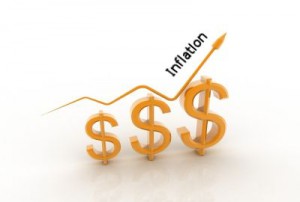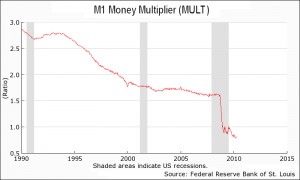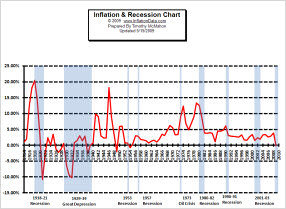By Deepcaster Equities-in-general have gone nowhere for the past decade (and have lost 30% or more when their prices are adjusted for inflation), and are in a Bear Market, with no end realistically in sight. And most Bonds and CD’s provide miniscule or even negative returns after adjusting for Real Inflation. And even many Commodities have not been consistently appreciating lately. We have long been an advocate of Gold and Silver, "the ultimate monetary metals". We still consider thems our #1 and #2 selections as the best fortress assets for profit and protection. Indeed, Deepcaster has two open ‘Buy’ Recommendations on a particular form of these Metals. And, as regular readers know, … [Read more...]
Energy Inflation- Oil and Gas Inflation
By Tim McMahon, editor It is extremely difficult to decide how over or under priced a commodity is when the scale we are comparing it to is constantly changing. By adjusting for inflation we can see what is happening to the price much easier. It pays to know what prices are in "Inflation Adjusted Terms". Once we adjust the gasoline price for inflation we can see that the average price for a gallon of gas since 1918 in June 2010 dollars is $2.39. So it is easy to tell whether gas is currently "cheap" or "expensive". For instance, the Annual Average gasoline price for 2009 was $2.34, which was extremely close to the long term average price of $2.39. While in 2008 the annual average … [Read more...]
What is the Real Definition of Inflation?
By Tim McMahon Define Inflation: A simple way to define inflation is "an increase in the price you pay for goods" but that only tells part of the story... It could also be seen as a "decline in the purchasing power of your money". But there is more to inflation than that. There are two sides to inflation "Price Inflation" and "Monetary Inflation". Jump to: Inflation Definition | Inflation Cause | Inflation Risk | Inflation Rate | Inflation Hedge Price Inflation vs Monetary Inflation: Technically, Price Inflation is when prices get higher or it takes more money to buy the same item and this is what people commonly think of when they hear the word inflation. Monetary Inflation … [Read more...]
Welcome to the Inflation Data Blog
With the Web 2.0 revolution everyone enjoys responding to articles and being able to share good articles with friends and other sites. But we have been a bit behind the curve because of the way our databases are hosted on InflationData.com so adding a blog has been impossible… up until now! But we have wanted to be able to get your feedback for a while now so we have created another site to allow us to provide more articles quicker in a Blog format and it is right here on Inflationdata.net. We would love to have your feedback on articles and suggestions for how we can improve this site. It is just in its infancy so be gentle with us as we get up to speed. All we ask is that you … [Read more...]
Velocity of Money and Money Multiplier- Why Deflation is Possible
By Tim McMahon Back in 1924, John Maynard Keynes called gold a barbarous relic. There is a thought prevalent these days that deflation is the new barbarous relic. In a speech in November of 2002, Federal Reserve chairman Ben Bernanke said, “I believe that the chance of significant deflation in the United States in the foreseeable future is extremely small… I am confident that the Fed would take whatever means necessary to prevent significant deflation… the effectiveness of anti-deflation policy could be significantly enhanced by cooperation between the monetary and fiscal authorities.” He went on to say, “the U.S. government has a technology, called a printing press (or, today, its … [Read more...]
Which is Better: High or Low Inflation?
It would seem intuitively obvious that low inflation is good for consumers, because costs are not rising faster than their paychecks. The problem with high inflation is that even with "cost of living" increases there is a time lag between when the cost of goods increases and when you get your raise. But recently commentators have been saying that "Low inflation introduces uncertainty". This is nonsense. During the high inflation "Eighties" I remember commentators saying "High Inflation introduces uncertainty". This is not quite true either. The truth is that steady inflation, whatever its level, if it can be relied upon to remain steady, does not introduce uncertainty. Changing … [Read more...]
Deflation or Inflation – Which is it?
By Tim McMahon, Editor It seems the debate on whether we will be facing inflation or deflation is heating up. This week I received emails from two different subscribers insisting that I was wrong. Well that is always a possibility but we will see... The first letter I received was from Jeff L. it said, "Your current "Annual Inflation" chart, graph, and commentary are very helpful. Thanks very much. The data would appear to contradict a recent article on your own site predicting a long period of deflation." My response was, "Personally, I think we are in for inflation. Robert Prechter (who is much smarter than I am) believes it will be deflation. At this point we are on a “knife … [Read more...]
The Calm Before the Inflationary Storm
I must be getting old. Things seem to change awfully quickly. It seems like just yesterday that gasoline was well over $4.00 a gallon and inflation was 5.6%. It was July 2008 and inflation was the hot topic, everyone was worried about costs climbing exponentially. It seemed like every time I went to the store things cost more. Oil was a speculator’s dream and a car owner’s nightmare. And then came the crash. Oil prices came crashing down along with the stock market and the banks. The big news was deflation. The media was beating the drum about how bad deflation was and how this was the first deflationary period since 1950. Funny, I didn’t hear anyone at the gas station or the … [Read more...]
Deflationary Forces Hit the Movies
Deflationary Forces- On March 4th 2009 the New York Times ran an article entitled, "Theater Chain Begins Recession Special: $1 Popcorn and Sodas" talking about Carmike Cinemas instituting their own "stimulus plan". In an effort to help flagging weekday sales the theater chain is cutting those outrageous concession stand prices. Normally during tough times people will cut back on discretionary spending perhaps opting for a night at home with Netflix rather than a night out at the theater. And this is what seems to be happening during weekday nights. However, during weekends quite the opposite is happening. It seems that receipts on weekends are actually up 17% so far in 2009 over … [Read more...]
Deflation and Depression through the Years
By Tim McMahon, Editor Deflation has cropped up at various times throughout the nineteenth and twentieth centuries. Overall since 1913 when the Bureau of Labor Statistics began tracking inflation we have had 22 years that had one or more months when the annual inflation rate was negative (i.e. deflation). Most of those are clumped into larger deflationary periods. The six major deflationary periods are: January 1921 - February 1923 26 months July 1924 - November 1924 5 months July 1926 - November 1933 7 ½ years (with only 5 positive months and 5 zero inflation months.) March 1938 - January 1940 18 months May 1949 - June 1950 … [Read more...]






